The Greatest Writer of modern Indian
literature
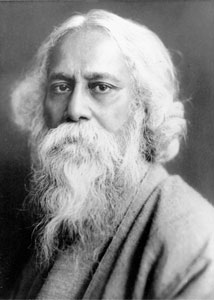 Rabindranath Tagore is the greatest writer of modern Indian
literature, Bengali poet, novelist, educator, and an early advocate of
Independence for India. Tagore won the Nobel Prize for Literature in
1913. Two years later he was awarded the knighthood, but he surrendered
it in 1919 as a protest against the Massacre of Amritsar, where British
troops killed some 400 Indian demonstrators. Rabindranath Tagore is the greatest writer of modern Indian
literature, Bengali poet, novelist, educator, and an early advocate of
Independence for India. Tagore won the Nobel Prize for Literature in
1913. Two years later he was awarded the knighthood, but he surrendered
it in 1919 as a protest against the Massacre of Amritsar, where British
troops killed some 400 Indian demonstrators.
|
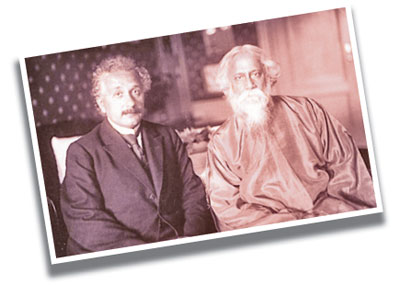
Rabindranath Tagore met Albert Einstein for the first time
in 1930 |
|
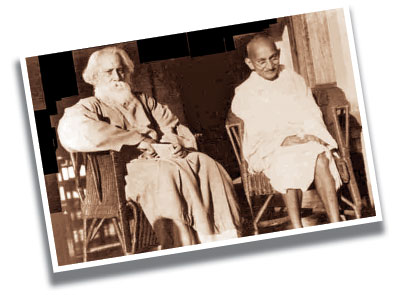
Tagore with Mahathma Gandhi whom he admired very much |
|
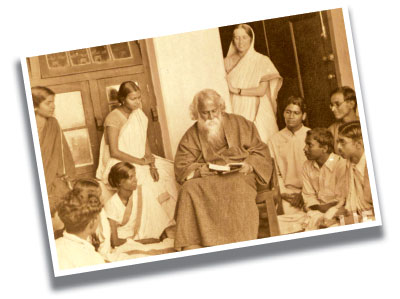
Tagore contributed immensely to Bengali literature. In this
file photo he is engrossed in teaching literature to the
crowds that gather. |
Tagore’s influence over Gandhi and the founders of modern India was
enormous, but his reputation in the West as a mystic has perhaps misled
his Western readers to ignore his role as a reformer and critic of
colonialism.
Rabindranath Tagore was born in Kolkota into a wealthy and prominent
family. His father was Maharishi Debendranath Tagore, a religious
reformer and scholar.
His mother, Sarada Devi, died when Tagore was very young – he
realised that she will never come back was when her body was carried
through a gate to a place where it was burned. Tagore’s grandfather had
established a huge financial empire for himself. He helped a number of
public projects, such as Calcutta Medical College.
Culture
The Tagores tried to combine traditional Indian culture with Western
ideas; all the children contributed significantly to Bengali literature
and culture. However, in My Reminiscences Tagore mentions that it was
not until the age of ten when he started to use socks and shoes. Tagore,
the youngest, started to compose poems at the age of eight. Tagore’s
first book, a collection of poems, came out when he was 17; it was
published by Tagore’s friend who wanted to surprise him.
Tagore received his early education first from tutors and then at a
variety of schools. Among them were the Bengal Academy where he studied
history and culture.
At the University College, London, he studied law and attended
lectures on English literature but left after a year – he did not like
the weather. Once he gave a beggar a gold coin – it was more than the
beggar had expected and he returned it. In England Tagore started to
compose the poem Bhagna Hridaj (a broken heart).
Marriage
In 1883 Tagore married Mrinalini Devi Raichaudhuri, with whom he had
two sons and three daughters. In 1890 Tagore moved to East Bengal (now
Bangladesh), where he collected local legends and folklore. Between 1893
and 1900 he wrote seven volumes of poetry, including Sonar Tari (1894,
The Golden Boat), and Kanika (1899, Short Poems).
This was a highly productive period in Tagore’s life, and it earned
him the rather misleading epitaph ‘The Bengali Shelley.’
More important was that Tagore wrote in the common language of the
people. This also was something that was hard to accept among his
critics and scholars.Tagore was the first Indian to bring an element of
psychological realism to his novels. Among his early major prose works
are Chokher Bali (1903, Eyesore) and Nastanirh (1901, The Broken Nest),
published first serially. Between 1891 and 1895 he published 44 short
stories in Bengali periodical, most of them in the monthly journal
Sadhana.
Especially Tagore’s short stories influenced deeply Indian
literature. ‘Punishment’, a much anthologised work, was set in a rural
village. It describes the oppression of women through the tragedy of the
low-caste rui family.
In 1901 Tagore founded a school outside Calcutta, Visva Bharati,
which was dedicated to emerging Western and Indian philosophy and
education. It become a university in 1921. He produced poems, novels,
stories, a history of India, textbooks, and treatises on pedagogy.
Tagore’s wife died in 1902, one of his daughters died the next year, and
in 1907 Tagore lost his younger son.
Tagore’s reputation as a writer was established in the United States
and in England after the publication of Gitanjali (Song Offerings),
about divine and human love. The poems were translated into English by
the author himself.
|

In contemplative mood |
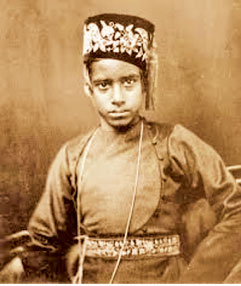
The young Tagore |
However, Tagore also experimented with poetic forms and these works
have lost much in translations into other languages.
Much of Tagore’s ideology come from the teaching of the Upahishads
and from his own beliefs that God can be found through personal purity
and service to others.
He warned of the dangers of nationalistic thought and stressed the
need for new world order based on transnational values and ideas, the
“unity consciousness.
” “The soil, in return for her service, keeps the tree tied to her;
the sky asks nothing and leaves it free.” Politically active in India,
Tagore was a supporter of Gandhi, but disagreed with Gandhi’s philosophy
of non-cooperation. Following the Bihar earthquake of 1936, which killed
thousands of people, Gandhi declared that the natural disaster was
punishment for the sin of untouchability.
Tagore protested, calling the claim irrational.All his life, he was
deeply interested in the goings-on in the Western world. In the United
States he travelled in 1912-13, 1916-17, 1920-21, 1929 and 1930. Riza
Shah Pahlavi, invited Tagore to Iran in 1932.
On his journeys and lecture tours Tagore attempted to spread the
ideal of uniting East and West. While in Japan he wrote: “The Japanese
do not waste their energy in useless screaming and quarrelling, and
because there is no waste of energy it is not found wanting when
required. This calmness and fortitude of body and mind is part of their
national self-realisation.”
Tagore met Albert Einstein for the first time in 1930. In a
conversation at Einstein’s residence in Caputh, Tagore argued that truth
is not independent of man.
Tagore wrote his most important works in Bengali, but he often
translated his poems into English. At the age of 70 Tagore took up
painting.
He was also a composer, settings hundreds of poems to music. Many of
his poems are actually songs and inseparable from their music. Tagore’s
Our Golden Bengal became the national anthem of Bangladesh.
Only hours before he died on August 7, in 1941, Tagore dictated his
last poem. His written production, still not completely collected, fills
nearly 30 substantial volumes. Tagore remained a well-known author in
the West until the end of the 1920s. Though his popularity has waned,
his many writings continue to be read and translated.
- Internet
|

